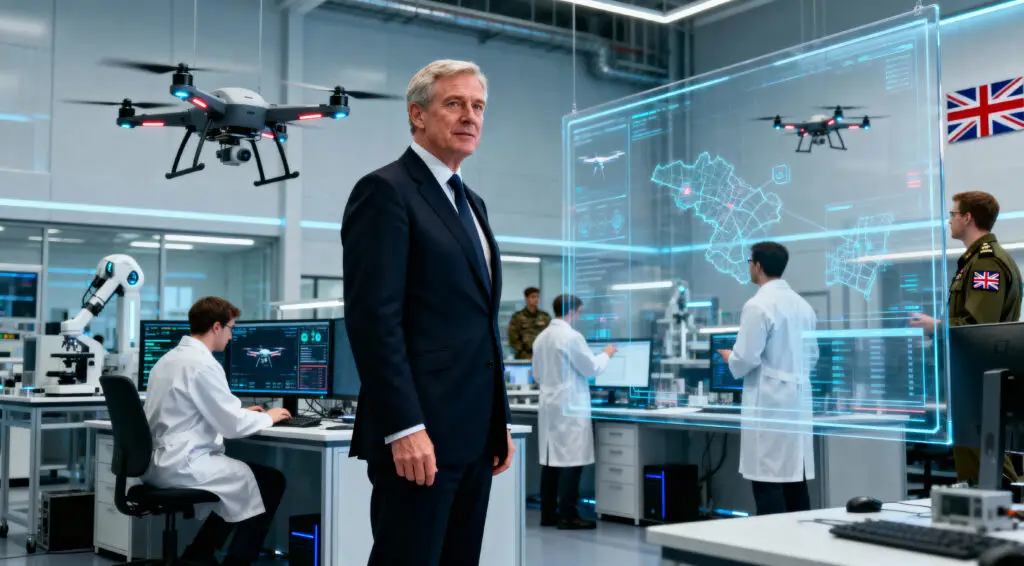Sir Jeremy Fleming Leads StirlingX Into a New Era of Defense Innovation
StirlingX, a UK-based firm that makes drones and data intelligence, has named Sir Jeremy Fleming, the former head of GCHQ, as its new chairman. The move is a big step forward for the firm and shows how much more important it is becoming in the defense and security technology field.
StirlingX wants to be the world’s top company in AI-driven autonomous systems, and hiring Fleming shows that. He has decades of expertise in national security, intelligence, and cyber strategy. His leadership is intended to help the company grow into the UK and allied defense sectors while also improving its manufacturing base at home.

Expanding Capabilities in Drone and Data Intelligence
StirlingX makes AI-powered drones and analytics solutions for defense, infrastructure, and business use. The company’s main goal is to provide real-time information, situational awareness, and secure data processing using technologies that work together on their own.
Company executives say that the capacity to deploy drones on their own and analyze live data on a large scale gives them a big edge on current battlefields, where speed, coordination, and precision are key to mission success.
Fleming Highlights the Transformative Power of AI Drones
Fleming said in a statement that using drones on a broad scale might change the game. He remarked, “Drones that can fly on their own and in large numbers are going to change all of our lives. They’ll help keep us safe, give us real-time intelligence pictures, and change the way we fight.”
He also said that StirlingX is “at the forefront of that revolution,” making independent, AI-driven systems that can spot new dangers and provide them an edge in operations. His support shows how artificial intelligence, data analytics, and new ideas in defense are coming together more and more.
Recommended Article: OPPO Partners With Google to Redefine Mobile AI and Privacy
Strengthening the UK’s Sovereign Defence Capabilities
StirlingX’s main goal is to keep its systems safe and free from parts that come from enemies. To do this, the company designs and builds all of its systems in the UK. This strategy fits with the government’s larger objective of bolstering its own defense capabilities as worries about supply chain vulnerability and foreign involvement grow.
The company’s systems are designed to work in dangerous places, making sure that both military and civilian activities can communicate safely, dependably, and without interruption.
Strategic Timing Amid Global Shifts in Defense Technology
Fleming’s appointment comes at a time when autonomous systems and drones are changing the way countries and businesses protect themselves. Unmanned technologies are changing what it means to have an information edge in war zones that are changing quickly, from surveillance and supplies to battlefield intelligence.
Defense analysts say that Fleming’s extensive knowledge of cyber operations and integrating intelligence will help StirlingX combine physical and digital defense systems, making them more responsive and better at protecting data.
Bridging Defense, Technology, and Cybersecurity
The new leadership structure at StirlingX is part of a larger trend in modernizing defense technology. AI, data fusion, and drone networks are becoming the building blocks of sophisticated security ecosystems. Fleming is in a unique position to manage this junction of data security and drone autonomy because he used to work for GCHQ, one of the world’s top cyber and intelligence organizations.
With his aid, the business wants to form relationships in markets that are aligned with NATO. This will let allied countries use StirlingX’s technologies in joint operations for surveillance, logistics, and critical response missions.
A Vision for the Future of Defense Technology
Sir Jeremy Fleming is in charge of StirlingX, which is ready to speed up its innovation roadmap and play a bigger part in the AI defense revolution. The company’s objective fits with a future when machine learning, autonomous systems, and data-driven decision-making are important for both national security and global stability.
Fleming stated, “By combining AI intelligence with sovereign engineering, we are creating technology that protects, informs, and empowers people and nations.”























